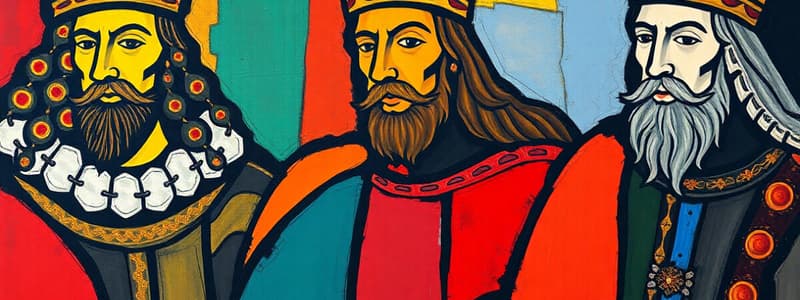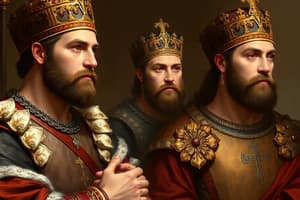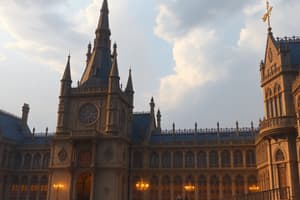Podcast
Questions and Answers
Critically analyze the long-term implications of the Magna Carta, signed by King John in 1215, on the evolution of English common law and its subsequent influence on constitutionalism in other nations. Be sure to comment on any potential issues with using it in a modern context.
Critically analyze the long-term implications of the Magna Carta, signed by King John in 1215, on the evolution of English common law and its subsequent influence on constitutionalism in other nations. Be sure to comment on any potential issues with using it in a modern context.
The Magna Carta laid the groundwork for limiting monarchical power and establishing due process, influencing the development of constitutional law worldwide. However, its direct applicability to modern legal systems is limited by its historical context and specific feudal concerns.
Assess the strategic and tactical innovations employed by Edward III during the initial phase of the Hundred Years' War, particularly focusing on the impact of the English longbow and the socio-economic factors that contributed to its effectiveness on the battlefield.
Assess the strategic and tactical innovations employed by Edward III during the initial phase of the Hundred Years' War, particularly focusing on the impact of the English longbow and the socio-economic factors that contributed to its effectiveness on the battlefield.
Edward III capitalized on the longbow's range and rate of fire in conjunction with dismounted knights, creating a devastating battlefield combination. Its effectiveness was rooted in England's socio-economic structure that incentivized archery practice.
Analyze the multifaceted impact of the Black Death on the English monarchy and feudal system during the reign of Edward III, specifically addressing its influence on labor relations, social mobility, and the subsequent Peasants' Revolt.
Analyze the multifaceted impact of the Black Death on the English monarchy and feudal system during the reign of Edward III, specifically addressing its influence on labor relations, social mobility, and the subsequent Peasants' Revolt.
The Black Death led to labor shortages, increased social mobility, and peasant unrest due to oppressive labor laws and taxes. This was significant stress on the feudal system and sparked the Peasants' Revolt.
Evaluate the political and psychological factors contributing to the deposition of Richard II, contrasting his style of governance with the expectations of the English nobility and the emerging parliamentary powers during the late 14th century.
Evaluate the political and psychological factors contributing to the deposition of Richard II, contrasting his style of governance with the expectations of the English nobility and the emerging parliamentary powers during the late 14th century.
Considering Henry IV's usurpation of the throne, discuss the legitimization strategies employed by the Lancastrian dynasty to consolidate power, examining the roles of Parliament, the Church, and propaganda in shaping public opinion and quelling opposition.
Considering Henry IV's usurpation of the throne, discuss the legitimization strategies employed by the Lancastrian dynasty to consolidate power, examining the roles of Parliament, the Church, and propaganda in shaping public opinion and quelling opposition.
Deconstruct the strategic objectives of Henry V's campaign in France during the Hundred Years' War, with particular attention to the Treaty of Troyes and its implications for the future of the English and French monarchies.
Deconstruct the strategic objectives of Henry V's campaign in France during the Hundred Years' War, with particular attention to the Treaty of Troyes and its implications for the future of the English and French monarchies.
Assess the impact of Henry VI's mental instability on the conduct of the Hundred Years' War and the outbreak of the Wars of the Roses, evaluating the roles of key figures such as the Duke of York and the Queen Margaret of Anjou in exacerbating political tensions.
Assess the impact of Henry VI's mental instability on the conduct of the Hundred Years' War and the outbreak of the Wars of the Roses, evaluating the roles of key figures such as the Duke of York and the Queen Margaret of Anjou in exacerbating political tensions.
Elaborate on the multifaceted causes of the Hundred Years' War, extending beyond immediate territorial disputes to include underlying economic rivalries, dynastic ambitions, and the evolving concept of national identity in both England and France.
Elaborate on the multifaceted causes of the Hundred Years' War, extending beyond immediate territorial disputes to include underlying economic rivalries, dynastic ambitions, and the evolving concept of national identity in both England and France.
Analyze the long-term consequences of the Hundred Years' War on the development of parliamentary institutions in England and the consolidation of royal authority in France, drawing parallels and divergences in their respective political trajectories.
Analyze the long-term consequences of the Hundred Years' War on the development of parliamentary institutions in England and the consolidation of royal authority in France, drawing parallels and divergences in their respective political trajectories.
Deconstruct the social, economic, and military factors that contributed to England's ultimate defeat in the Hundred Years' War, despite initial successes, focusing on the roles of Joan of Arc, internal political divisions, and evolving military technologies.
Deconstruct the social, economic, and military factors that contributed to England's ultimate defeat in the Hundred Years' War, despite initial successes, focusing on the roles of Joan of Arc, internal political divisions, and evolving military technologies.
Flashcards
Magna Carta
Magna Carta
Signed in 1215, it limited the king's power and ensured equal laws, representing a check on royal authority.
House of Commons
House of Commons
Established during Henry III's reign, it marked the start of parliamentary governance.
Black Death
Black Death
A devastating plague that killed millions, affecting both the army and the economy.
Battle of Agincourt
Battle of Agincourt
Signup and view all the flashcards
Wars of the Roses
Wars of the Roses
Signup and view all the flashcards
Hundred Years' War
Hundred Years' War
Signup and view all the flashcards
Edward III
Edward III
Signup and view all the flashcards
Henry IV
Henry IV
Signup and view all the flashcards
Study Notes
- Following Henry II, several monarchs ruled, each with unique characteristics and impacts on England.
Monarchs After Henry II
- Young King: Henry II's first son, who died before he could rule.
- Richard I (The Lionheart): Henry II's third son, a warrior king who loved war, died in battle, and had no children.
- John (Lackland): Henry II's fourth son, viewed as cruel and unpopular; he was excommunicated by the Pope.
- John signed the Magna Carta in 1215, which limited the king's power and established equal laws.
- Henry III: John's son, became king at age 9, influenced by his wife's relatives, rebuilt Westminster Abbey, started the House of Commons, and was a patron of the arts.
- Edward I: Married Eleanor of Castile.
- Edward II: Married Isabella of France.
- Edward III: Sought to regain territories in Scotland and France, initiating the Hundred Years' War.
- Edward III's son, The Black Prince, led attacks on French cities.
- The Black Death (bubonic plague) killed millions, and the Black Prince also died.
- Two other sons of Edward III were John of Gaunt (Duke of Lancaster and friend of Chaucer) and Edmund of York (founder of the House of York).
- Richard II: Son of the Black Prince, became king at age 10, was considered faithless, unjust, and extravagant; he was deposed by his cousin Henry of Lancaster.
- Richard II put down the Peasants' Revolt but became more authoritarian after his wife's death.
- Henry IV: Son of John of Gaunt, returned from exile with the church's support, becoming the first Lancastrian king.
- Henry IV claimed Richard's power was illegitimate since he was the eldest son of John.
- Henry V: Son of Henry IV, won battles in the Hundred Years' War, married Katherine of Valois (daughter of Charles of France), and died before ruling France.
- Henry VI: Son of Henry V and Katherine of Valois, became king at 10 months old, had mental health issues, and relied on his uncle, the Duke of York, to rule.
- During Henry VI’s rule, England lost all territories in France except one, and he participated in the War of the Roses.
Hundred Years' War
- England and France shared Celtic culture before the Roman Empire, altered by the Norman Conquest and Roman expansion.
- Kings Richard and John lost territories in France, leading Edward III (nephew of the French king) to claim the French throne.
Phases
- Edward III claimed the French crown, starting the war.
- England invaded France, winning battles with longbows and other strategies.
- The Black Death impacted both the army and the economy.
- High taxes imposed to fund the army led to revolts, such as the Armagnacs and Burgundians in France.
- At Agincourt, England, led by Henry V, gained power around 1422, also securing his position by marrying Katherine of Valois.
- In 1422, Henry V died, and the French supported Charles VII.
- By 1453, the war ended with England losing almost all territories in France.
Consequences
- Political: In England, Parliament gained power, limiting the king's authority, while in France, the monarchy grew stronger.
- Economic: Peasant revolts led to high taxes.
- Cultural: Both countries developed distinct cultures and languages, creating their own identities.
- The French monarchy lasted until the French Revolution in 1789, when France became a republic.
- The Hundred Years' War contributed to the War of the Roses in England.
- The war ended in 1453 when the French chose Charles VIII as king.
Studying That Suits You
Use AI to generate personalized quizzes and flashcards to suit your learning preferences.




